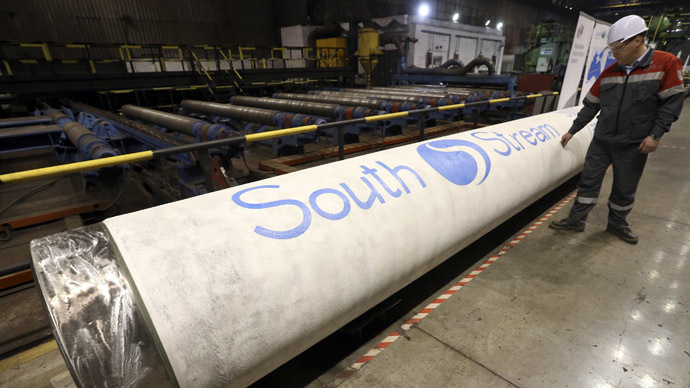'EU wants to decide who owns the pipeline operating outside it’

Attempts to halt the construction of the South Stream pipeline is another deranged power and land grab by Brussels, trying to dictate its own roles outside the EU, global financial markets expert Patrick Young told RT.
RT:So it looks like there's disagreement within the Serbian government over the South Stream project. How can those conflicting statements be explained?
Patrick Young: One of the things we have to bear in mind is that obviously when you look at a large infrastructure project, the conflict may not be actually more than just project management. I mean the Deputy Prime Minister obviously when she spoke in Serbia this morning, what she may have said is that there is going to be of course a problem with the actual delivery of the pipeline in terms of if there is a point to Serbia delivering the infrastructure across the land border with Bulgaria. And therefore, the Prime Minister is replying quite rapidly and said “No, the project goes on, we are going to continue building, we want that several billion dollars of investment in Serbia, we need the jobs, we want to be effectively connected as a gas pipeline to the rest of Europe” in the same way as Tito's strategy for the former Yugoslavia was to make the Yugoslavs the central focal point for the whole of European transit and that’s why they had better roads, better motorways than any other part of the Soviet bloc.
RT:If Serbia is forced to halt the construction of South Stream pipeline... How much does it stand to lose from this?
PY: I think it is going to be a very significant problem to Serbia. But actually the problem here is not going to be so much just the loss of jobs, but the overall motivation of the Serbian people. It is going to be seen as another disappointment with the European project. Let’s face it. NATO was the organization that was initially built for defense and ultimately went on the offensive and bombed the Serbs and their homes only twenty years ago. We have seen the situation where there is a very uneasy relationship between east and west within Serbia, simply because of the way it has been treated by the EU. Either we have got this manipulation by John McCain and various senators, then also "President Barossa" who is looking towards his retirement and therefore, presumably a cushy position within an American bank. We are in a situation when we can’t really see a lot of trust being built as Serbia tries to negotiate its way into the EU, and indeed, therefore, it maybe that Serbia ultimately decides as part of this collateral damage that perhaps it ought to be pivoting to the east, just as Russia has done recently, with part of the Siberia pipeline.
RT:Brussels says it needs to look into possible violations of EU competition rules before the project can be given the green light. But South Stream was launched seven years ago… Why is Brussels expressing its concerns only now?
PY: This is another deranged power grab, land grab by Brussels, attempting to dictate its own roles outside the EU block. And essentially we have a farcical situation here where the EU is trying to effectively say that it has the opportunity to decide who owns the pipeline that operates outside the EU. That is farcical. That is a really ridiculous tenet upon which to apply your rules. The EU is just trying to take something from the US playbook and even today the US government is trying to attack European banks in their own backyard in America. Therefore, it is all part of a greater power politics. The difficulty is that the EU does not have the collateral to actually make this position stick.
The statements, views and opinions expressed in this column are solely those of the author and do not necessarily represent those of RT.
The statements, views and opinions expressed in this column are solely those of the author and do not necessarily represent those of RT.













